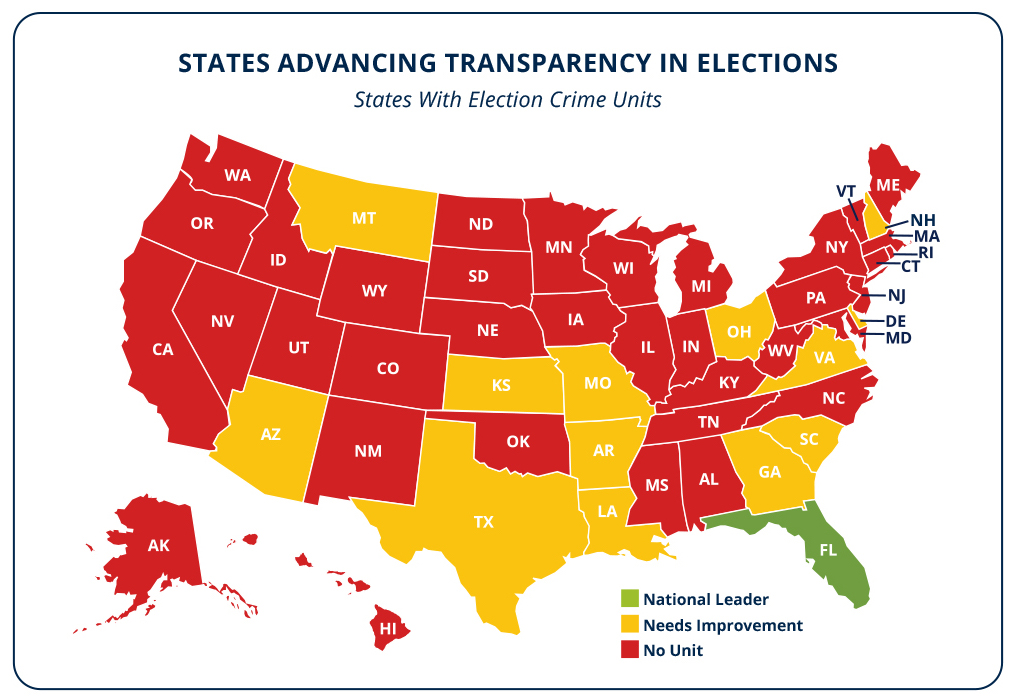Election Reforms States Should Consider Before 2024
- BY FGA
We’re roughly one year out from another major election.
After the 2020 election raised several questions, states across the country took action to put safeguards in place to protect election integrity and restore trust.
Georgia was one of the first states to move forward with bold reforms to protect their elections and helped inspire other states to do the same. The Election Integrity Act of 2021 included several major reforms, including changes to ballot processing, legislative oversight over lawsuits, and new penalties to prevent abuse of power and the mishandling of absentee ballots—to name a few.
One of the most impactful reforms in Florida’s election laws since 2020 was the creation of its Office of Election Crimes and Security. This new election crimes unit receives and reviews reports of irregularities and alleged election law violations. It then investigates and, if needed, refers the information to law enforcement for additional investigation and/or prosecution. The unit has received thousands of complaints. As of July 2023, the unit has made 1,479 criminal referrals to law enforcement—13 led to felony convictions and 32 have led to arrests or warrants being issued. Thirty-nine third-party organizations have also been fined more than $100,000 for election law violations. To add more transparency to the process, a report is required to be made available to both the legislature and the public regarding the unit’s findings.

In its hefty 2022 election integrity law, South Carolina included an impressive 20 reforms, including rigorous post-election audits, additional absentee ballot witness requirements, and annual voter roll maintenance.
Kansas lawmakers overrode their governor’s veto on a bill that prevents the governor from entering deals with third-party organizations without notifying the legislature—a law that was needed after the governor shadily met with far-Left groups to influence the 2020 election and didn’t tell anyone until nearly two years later.
Twenty-seven states have taken action to ban or heavily restrict private funding in local elections (Zuckerbucks).
As the next election rapidly approaches, here are a few reforms states across the country should consider so that their residents have confidence in the democratic process.
Block Zuckerbucks 2.0 and any other outsider attempt to influence elections
The states passing bans or restrictions on Zuckerbucks did not sway the Center for Tech and Civic Life (CTCL, the organization that worked with Mark Zuckerberg to distribute money in 2020) from attempting to influence elections across the country. CTCL launched the U.S. Alliance for Election Excellence and found loopholes in election laws that allowed them to funnel in additional grants. Fortunately, states like Georgia have acted promptly to close loopholes that allow for non-authorized funding in elections. More states can and should do the same.
Establish (and codify) an election crimes office—or change who can prosecute
In many states, district attorneys are the only individuals authorized to prosecute election crimes. That becomes a problem when your local district attorney is objectively biased, like many soft-on-crime, Soros-funded district attorneys are. There is a way states can get around this roadblock. States should follow Florida’s lead by passing legislation creating a designated election crimes unit tasked with investigating crime and referring it to law enforcement. States should also grant attorneys general the same authority as local district attorneys to prosecute election crimes. This will build checks and balances into the system, provide accountability for district attorneys, and help deter would-be criminals from committing election fraud.
Prohibit ranked-choice voting
American elections should be one person, one vote. Ranked-choice voting is a scam that turns elections into a game to be won. Worst of all, a key feature of this scheme is the tossing of ballots into the trash. There’s a reason why one party seems to be behind the push for ranked-choice voting across the country—they have the most to gain from its adoption.
Maine and Alaska both use ranked-choice voting and the results have been nothing short of disenfranchising and infuriating for most voters.
Several states have made the wise decision to outright ban the use of ranked-choice voting and any other that values protecting our democratic system should do the same.

Require more personal identity verification for mail-in ballots
Many states require photo or some other form of identification when voting in person, but the same protections are not extended to mail-in ballots. To help ensure that mail-in ballots are being submitted by the correct voter, states can require the last four digits of a Social Security number, a voter ID number, or some other form of personal identification.
Restrict who can turn in other voters’ ballots to prevent harvesting
Another way to help guarantee that votes properly belong to the individual voter is to restrict ballot harvesting practices. Certain populations, particularly the elderly, are vulnerable to political operatives collecting—and possibly coercing or altering—ballots. The easiest ways to prevent this are to restrict the number of ballots an individual person can return to a voting center and limit who can return someone’s ballot to members of their family or a designated caretaker.
Get rid of drop boxes
The pandemic is over, and it’s time for pandemic-era election exceptions to end as well. A big one was the wide use of ballot drop boxes. They’re vulnerable to tampering and shouldn’t be a normal part of elections. Realistically, states can remove the use entirely and return to their pre-pandemic processes. But, if drop boxes are popular, then are several commonsense reforms that can be implemented to safeguard drop boxes from bad actors, like putting them exclusively in government buildings with working security cameras and other protections.
These are only a handful of the ways states can protect election integrity ahead of another major election. Here are even more.
